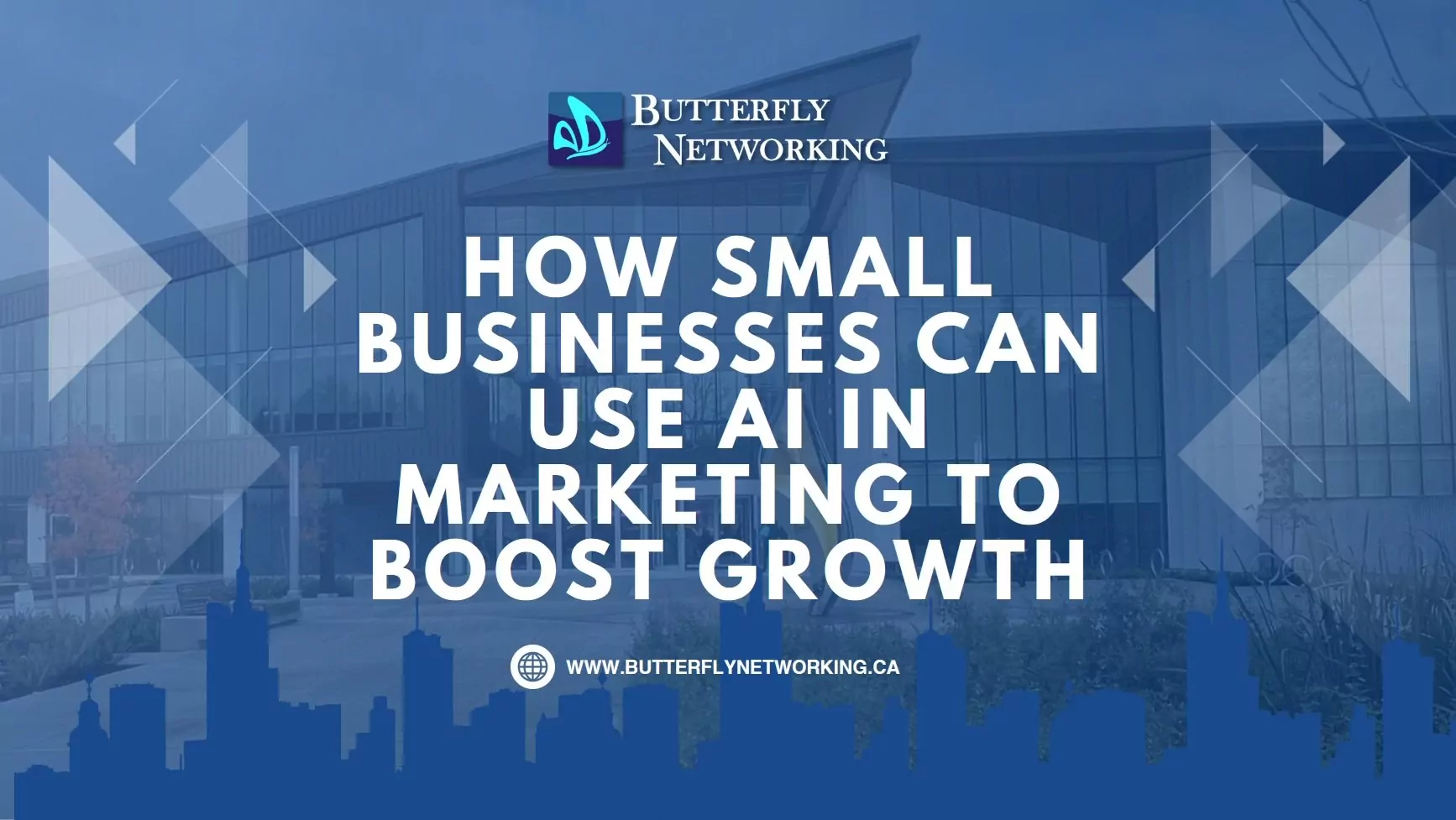How Small Businesses Can Use AI in Marketing to Boost Growth
AI Tools and Strategies to Elevate Marketing for Small Businesses, Driving Growth and Enhancing Customer Engagement

In the fast-evolving digital landscape, small businesses are constantly seeking innovative strategies to gain a competitive edge. One of the most transformative tools at their disposal is artificial intelligence in marketing. By integrating AI, small enterprises can streamline operations, enhance customer engagement, and optimize marketing efforts, ultimately driving growth and success. This blog will explore how small businesses can use AI in marketing, offering practical applications and insights that can be implemented immediately. As we delve into this exciting topic, you'll discover how AI tools for small businesses can revolutionize your digital marketing strategies and lead to impressive results.
1. Understanding AI-Driven Marketing
AI-driven marketing refers to the use of advanced algorithms and machine learning to analyze consumer behavior and improve marketing strategies. By harnessing the power of big data, small businesses can create targeted campaigns that resonate with their audience. For instance, companies like Amazon and Spotify use AI to analyze user preferences, providing personalized recommendations that significantly increase engagement. Small businesses can adopt similar strategies by utilizing AI tools to analyze customer data and tailor their marketing accordingly.

Moreover, AI can automate various marketing tasks, such as social media posting and email campaigns. Tools like Hootsuite and Mailchimp incorporate AI to optimize posting times and personalize email content based on user behavior. This not only saves time but also enhances customer experience, leading to higher conversion rates. By embracing AI-driven marketing, small businesses can streamline their workflows and focus on more strategic initiatives that drive growth.
Case studies demonstrate the effectiveness of AI in marketing. For example, a small retail store that implemented AI-driven marketing strategies saw a 30% increase in sales within six months. By leveraging data analysis, they were able to identify their most profitable customer segments and adjust their marketing efforts accordingly. This highlights the potential of AI to transform marketing strategies for small businesses.
2. Leveraging AI Tools for Small Businesses

There are numerous AI tools specifically designed for small businesses that can enhance marketing efforts and drive efficiency. These tools range from customer relationship management (CRM) systems to chatbots and data analytics platforms. For instance, HubSpot offers an AI-powered CRM that helps businesses track customer interactions and predict future behaviors. This allows small businesses to personalize their marketing strategies based on insights derived from customer data.
Additionally, chatbots powered by AI can provide immediate customer support, answering queries and assisting with purchases 24/7. Companies like Drift and Intercom have developed advanced chatbot solutions that can engage customers in real-time, improving user experience and increasing sales opportunities. Implementing such AI tools not only enhances customer satisfaction but also frees up valuable resources for small businesses.
Moreover, AI-driven marketing automation platforms can streamline repetitive tasks, allowing small businesses to focus on larger goals. Tools like Marketo and ActiveCampaign enable businesses to automate email campaigns, social media posts, and other marketing activities. This ensures consistency in messaging and allows businesses to maintain a strong online presence without overwhelming their teams.
3. Implementing Data-Driven Digital Marketing Strategies

One of the key advantages of using AI in marketing is the ability to implement data-driven strategies. By analyzing customer data, small businesses can gain insights into purchasing behaviors, preferences, and trends that inform their marketing decisions. For example, Google Analytics can provide valuable data regarding website traffic and user engagement, allowing businesses to adjust their marketing efforts in real-time.
Furthermore, predictive analytics can forecast future customer behaviors, enabling businesses to create proactive marketing strategies. By anticipating customer needs, small businesses can tailor their offerings and engage customers at the right moments. This could mean sending personalized offers during peak shopping times or targeting customers with specific ads based on their browsing history.
Case studies illustrate the effectiveness of data-driven strategies. A small e-commerce store that utilized predictive analytics saw a 40% increase in conversion rates after implementing targeted marketing campaigns based on customer behavior. This demonstrates how leveraging data can significantly enhance marketing effectiveness for small businesses.
4. Enhancing Customer Engagement with AI

Customer engagement is crucial for small businesses looking to foster loyalty and drive repeat sales. AI can play a pivotal role in enhancing engagement through personalized interactions and targeted content. By analyzing individual customer preferences, businesses can create tailored marketing messages that resonate with their audience.
For instance, AI can be utilized to segment customers based on their behaviors, allowing businesses to deliver relevant content. Email marketing platforms like Mailchimp offer segmentation features that enable small businesses to send personalized emails to different customer groups. This targeted approach increases the likelihood of engagement and conversions.
Moreover, social media platforms are increasingly incorporating AI to enhance user experience. Tools like Buffer and Sprout Social leverage AI to analyze engagement metrics and suggest optimal posting times. By utilizing these insights, small businesses can maximize their social media presence and engage with customers more effectively.
Conclusion

In summary, integrating AI into marketing strategies can significantly benefit small businesses by enhancing efficiency, improving customer engagement, and enabling data-driven decision-making. By understanding how small businesses can use AI in marketing, you can implement actionable strategies that drive growth and success in a competitive digital landscape. Embrace the transformative power of AI and explore the various tools and techniques available to you today. For more information on leveraging AI for your business, contact Butterfly Networking, call us at 778-835-4032, and let's discuss how we can help you leverage AI marketing strategies tailored for your business in New Westminster.
Check out our newsletter Hyperlocal AI Weekly, for lots of great tips and strategies you can implement right away.
Frequently Asked Questions

What are some benefits of using AI in marketing for small businesses?
Using AI in marketing offers numerous benefits for small businesses, including improved efficiency, enhanced customer experience, and data-driven decision-making. AI tools can automate repetitive tasks, allowing teams to focus on strategic initiatives. Additionally, AI enables personalized marketing, which can lead to higher engagement and conversion rates. By leveraging data analytics, small businesses can gain insights into customer behavior, allowing them to tailor their marketing strategies effectively.
How can small businesses choose the right AI tools for their marketing needs?
Choosing the right AI tools for marketing involves assessing specific business needs and objectives. Small businesses should consider factors such as budget, ease of use, integration capabilities, and the specific features offered by the tools. It's beneficial to start with a trial or demo to evaluate how well the tool aligns with marketing goals. Additionally, seeking recommendations from peers or industry experts can provide valuable insights into which tools have proven effective for similar businesses.
Is AI marketing suitable for all types of small businesses?
Yes, AI marketing is suitable for a wide range of small businesses, regardless of industry. Whether in retail, services, or e-commerce, AI can provide valuable insights and automate processes that enhance marketing efforts. However, the specific applications of AI may vary depending on the industry and target audience. Small businesses should carefully assess their unique needs to determine how AI can best serve their marketing goals.
